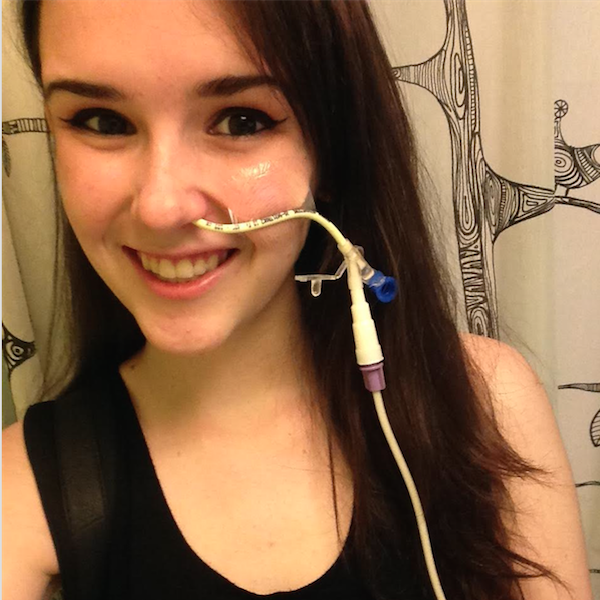No, My Illness Is Not More 'Real' Than a Mental Illness
 When I got my first nasal feeding tube, everyone started asking questions. I didn’t mind — I would ask questions too if my friend pulled a giant piece of spaghetti out of her nose. People asked things like, “What happened?” “What is that?” or “Are you OK?” and I explained I have gastroparesis. Occasionally, people freaked out or gave me sympathetic cop-out lines, but I had a relatively easy time dealing with people who don’t understand.
When I got my first nasal feeding tube, everyone started asking questions. I didn’t mind — I would ask questions too if my friend pulled a giant piece of spaghetti out of her nose. People asked things like, “What happened?” “What is that?” or “Are you OK?” and I explained I have gastroparesis. Occasionally, people freaked out or gave me sympathetic cop-out lines, but I had a relatively easy time dealing with people who don’t understand.
I was actually more surprised by those who were familiar with with nasal tubes. They asked things like “Do you have a digestive disease?” or “Are you recovering from an eating disorder?” To which I would answer, “I have gastroparesis.” Many of their responses were immediate, even if they’d never heard of my disease. “Oh, good! I was afraid you were one of those girls trying to starve themselves;” “I’m glad it’s a real illness and not just an eating disorder;” “Oh, so you actually have a problem…” and other disturbing remarks that made mental illness sound like no big deal.
Let me assure you: mental illness is a big deal. I don’t have an eating disorder, but that doesn’t mean I’m “more deserving” of a feeding tube than someone who does. That doesn’t mean I’m “sicker,” or that someone with a mental illness isn’t actually sick. It is a mental illness. Your brain can get sick just like your stomach, heart and lungs can.
I can’t imagine how hard it must be to respond to the questions I’ve gotten while actually having with a mental illness. People have gone as far as apologizing for making an assumption about my tube, as if the very idea of having a mental illness should disgust me. To constantly battle your own mind is exhausting, physically and mentally. How dare you undermine the struggle of someone suffering from a mental illness.
Gastroparesis is one of many chronic and debilitating physical illnesses I fight every day. My conditions cause me to be in and out of the hospital, permanently tube-fed and dependent on multiple medications. I have several friends who have chronic mental illnesses. Many are frequently hospitalized and dependent on medication — some are too sick to attend school. See the similarities? No matter what the malady, a chronic condition is hard to deal with. Especially when you’re talking about an “invisible illness” (when someone looks healthy despite having serious health issues).
The mental illness stigma in our culture has to change. An eating disorder is so much more than a girl who wants to look like a supermodel. Anxiety is so much more than worrying too much. Depression is so much more than being sad all of the time. You would never tell a person with cancer or heart disease to “get over” his pain, so why would you say that to someone with a mental illness?
Every 40 seconds, someone in the world takes their own life. Approximately 12 people harm themselves for every reported suicide attempt. And although millions of people around the world are affected by mental illness, it seems like people still don’t take it seriously. If we could change that, maybe we could change those statistics.
No, I do not struggle with mental illness. My feeding tube is the result of a progressive gastrointestinal disorder, and I am not ashamed of the thing keeping me alive. Those in treatment for mental illness should not be ashamed either. As a matter of fact, they should be proud of the courage it took to seek out that help. The only people who need to be ashamed are the ones who have the audacity to belittle someone’s fight.
